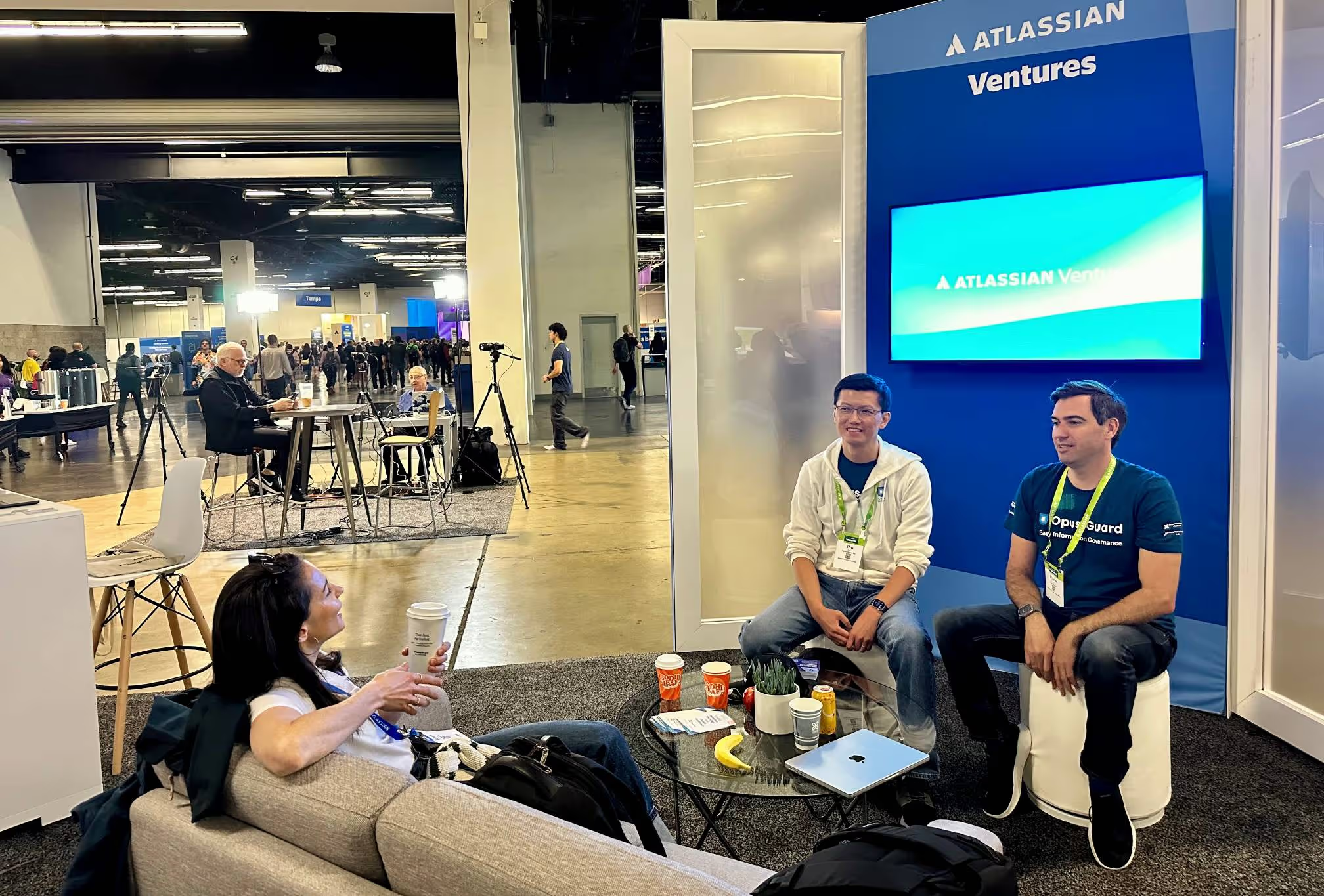No teníamos la intención de crear una empresa de inteligencia artificial, pero lo hicimos
Cuando creamos Opus Guard, no perseguíamos la publicidad de la IA. De hecho, bromeábamos diciendo que estábamos creando uno de los productos menos glamurosos del mundo tecnológico: un sistema para mantener los espacios de Confluence y Jira ordenados, cumpliendo con las normas y a salvo de cualquier riesgo. A los equipos legales, de TI y de seguridad les encantó porque les daba la confianza de que el contenido antiguo, anticuado o riesgoso no volvería a perseguirlos en litigios o auditorías.
No era ostentoso. No era «IA». Pero era necesario. Y funciona muy bien.

Pasamos unos años y, de repente, la IA no es solo una novedad: ahora es una parte fundamental de la forma en que las empresas operan y avanzan con rapidez. Herramientas como Atlassian Rovo, Repigar, y Agentforce de Salesforce están transformando la forma en que los equipos incorporan, venden y apoyan a los clientes e incluso la forma en que los ejecutivos controlan lo que sucede en la empresa.
- Nuevas contrataciones ya no esperan semanas para recibir formación: pueden impulsar una IA y aprender al instante cómo funciona la empresa
- Equipos de ventas y soporte puede responder por sí mismo en lugar de buscar en un sinfín de páginas wiki
- Equipos de marketing puede crear contenido rápidamente, crear y analizar campañas, mensajes y comentarios del mercado en tiempo real para adaptarse más rápido
- Ejecutivos puede obtener rápidamente claridad sobre los proyectos sin programar una docena de reuniones de actualización
Pero aquí está la paradoja: si bien los ejecutivos están ansiosos por implementar herramientas de inteligencia artificial en todas partes, demasiadas organizaciones no alcanzan el ROI prometido porque no se han establecido las bases. Sin una gobernanza de datos buena y disciplinada: clasificar los datos, limpiar, seleccionar y retirar con regularidad lo que ya no pertenece, esas potentes herramientas de inteligencia artificial terminan amplificando el ruido en lugar de enviar señales.
Una mala respuesta puede costar millones en pérdida de confianza e ingresos
La IA se ha convertido en el acelerador definitivo en casi todos los roles, especialmente en los equipos que generan ingresos, como Ventas y Marketing. Pero hay un inconveniente: es tan buena como el contenido con el que se publica. Hay mucho en juego: incluso una sola respuesta falsa o engañosa de una herramienta de inteligencia artificial puede ser suficiente para romper la confianza. Cuando un equipo duda de la fiabilidad de la IA, es mucho menos probable que siga utilizándola, a pesar de que estas herramientas son capaces de generar un ROI mucho más alto que los métodos tradicionales.
Aquí es donde Opus Guard ofrece un valor tangible para el cliente: al mantener las bases de conocimiento precisas y actualizadas, nos aseguramos de que los materiales de capacitación de ventas, los datos de los productos y los mensajes incluidos en la IA sean mucho más precisos. El resultado son respuestas más fiables para los clientes potenciales y potenciales, tasas de éxito más altas y un aumento directo del rendimiento de los ingresos.
El secreto sucio de la IA en la empresa
Durante años, el contenido malo y desactualizado se ocultó a plena vista porque la búsqueda de Confluence era terrible. Si algo estaba obsoleto o era inexacto, lo más probable era que nadie lo encontrara nunca. Ese ya no es el caso.
La IA cambia el juego. Ahora, cada página obsoleta, duplicada o que no cumple con los requisitos tiene una forma de aparecer al instante. El mismo contenido que antes se ocultaba en las sombras ahora está al frente y al centro de la ventana de contexto de tu IA.
Si sus espacios están desordenados, las respuestas de la IA también lo serán. En las industrias reguladas, eso no solo es frustrante, sino también riesgoso. Por ejemplo, una información de identificación personal no intencionada (como la dirección de la casa de un empleado oculta en un documento antiguo) podría aparecer de repente en una respuesta de la IA, o una solicitud de certificación que había caducado hace mucho tiempo podría reflejarse en un cliente como si estuviera actualizada. Estos errores aparentemente pequeños crean enormes riesgos legales, de cumplimiento y de reputación.
Como ya hemos dicho anteriormente, MIT El estado de la IA en los negocios en 2025 informe lo confirma: el 95% de los pilotos de IA empresarial no logran ofrecer un ROI significativo, y las bases de conocimiento desordenadas y los flujos de trabajo inadecuados son una de las principales razones. Sin una disciplina de contenido, no se puede confiar en que ni siquiera las herramientas de inteligencia artificial más avanzadas ofrezcan un valor real.
El cambio de IA que no esperábamos
Aquí es donde está nuestra historia Opus Guard cierra el círculo.
No nos propusimos crear una empresa de inteligencia artificial. Sin embargo, al resolver el «aburrido» problema de la retención de contenido, sentamos las bases que hacen que la IA empresarial funcione realmente bien.
Opus Guard's Gestor de retención de contenido ya no se trata solo de cumplimiento. Se trata de mantener el limpieza de ventana de contexto por lo que las herramientas de IA ofrecen resultados precisos, actuales y seguros.
En otras palabras:
- Sin Opus Guard, la IA sufre de basura que entra y saca basura y un bajo ROI
- Con Opus Guard, La IA se transforma en un verdadero motor de ROI porque simplemente no se pueden tener despliegues de IA precisos, de alto ROI y exitosos sin una ventana de contexto limpia
El primer paso para el éxito de la IA
En Opus Guard, creemos que la verdadera historia no gira solo en torno a los modelos de IA. Se trata de la higiene de los datos que contienen. Nuestras herramientas brindan a las empresas la disciplina y el gobierno necesarios para garantizar que lo que se destina a la IA sea confiable.
No teníamos la intención de crear un producto de IA. Pero resulta que creamos una de las piezas más esenciales de la cadena de herramientas de inteligencia artificial.
Opus Guard es el primer paso hacia el éxito de la IA: mantener limpia la ventana de contexto de la IA.


